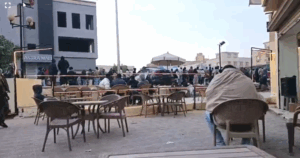Hunger deepens in Darfur camps: WFP in Sudan ‘must make heart wrenching decisions’ amid $366 mln funding shortfall
Soaring food prices, which have resulted in even the basics becoming unaffordable to the poor, are forcing many destitute displaced people in Darfur to face hunger every day. However, the UN World Food Programme (WFP) in Sudan laments that due to a funding shortfall of $366 million for 2022, WFP is having to prioritise assistance based on the resources available and “make heart wrenching decisions, knowing that we cannot help everyone in Sudan who needs it”.
 A displaced man in Khor Abeche, South Darfur, with a sack of millet distributed by the WFP (File photo: Albert González Farran / Unamid)
A displaced man in Khor Abeche, South Darfur, with a sack of millet distributed by the WFP (File photo: Albert González Farran / Unamid)
Soaring food prices, which have resulted in even the basics becoming unaffordable to the poor, are forcing many destitute displaced people in Darfur to face hunger every day. However, the UN World Food Programme (WFP) in Sudan laments that due to a funding shortfall of $366 million for 2022, WFP is having to prioritise assistance based on the resources available and "make heart wrenching decisions, knowing that we cannot help everyone in Sudan who needs it”.
WFP in Sudan has faced challenges on the ground, especially after three major WFP warehouses in the North Darfur capital of El Fasher were raided and looted in December 2021. The unstable security situation has also made matters precarious for logistics, as drivers of convoys transporting WFP aid have been targeted by bandits.
People in camps including Zalingei in Central Darfur, Gereida in South Darfur, and Fata Borno camp in Kutum locality, North Darfur, have called on the WFP for more humanitarian aid, and the return of support to those from whom it was previously withdrawn.
Hamidiya camp
Sheikh Mohamed Yagoub, head of Hamidiya camp near Zalingei, said that the WFP provides SDG4,000* per person per month, and that they have not received the support for July so far.
He explained that the WFP classified the displaced people in Hamidiya camp, numbering about 74,000 people, into three categories; one that receives support monthly, another receives support once every three months, and sometimes every six months. As for the third category, they do not receive any support.
Sheikh Yagoub indicated that the displaced are now all incapable and unable to meet the basic costs of life, they do not have sources of income, so support must be restored for all and increased in proportion to the rise in prices in general.
‘Displaced people usually practice seasonal agriculture on their lands near the camp, but the insecurity prevented them from farming this season’ – Camp leader
Gereida camps
A displaced woman from Gereida camps told Radio Dabanga that the WFP has stopped the support of large numbers of displaced people. Only a few are now receiving SDG 4,000 per person per month.
Others receive support every three months, she said. The displaced used to depend on small farms in the rainy season, but the insecurity in the region kept them from the lands.
The source appealed to “the responsible authorities to provide security, increase the support, and to provide it to all displaced people without exception”.

The baby receives nutrition supplements from WFP to treat/prevent malnutrition.
(File photo: WFP)
Fata Borno camp
Displaced people living in Fata Borno camp in Kutum locality, North Darfur, also complain of a food crisis, with poor health services and a shortage of drinking water.
Yahya El Khumus told Radio Dabanga that the WFP classifies the camp’s displaced people into three categories. The first category provides them with a month’s support of SDG3,000 per person, which does not exceed 10 per cent of the camp’s displaced. The second category is provided with support once every six months within the framework of work in exchange for food, and it does not exceed 30 per cent of the total camp residents.
He said that the rest was halted, noting that while the displaced people usually practice seasonal agriculture on their lands near the camp, the insecurity prevented them from farming this season.
He added that there is a deterioration in the health situation in the camp and the emergence of malnutrition among the children, with a scarcity of drinking water due to the stoppage of the tanks providing drinking water.

File photo: Albert González Farran / Unamid)
WFP in Sudan
In response to questions from Radio Dabanga, the WFP in Sudan says in a statement today that it regrets that its cash assistance to internally displaced people has been delayed. “WFP is currently facing a funding shortfall of $366 million from now until the end of 2022. Additionally, insecurity across Darfur impedes our ability to deliver assistance to certain locations, particularly areas where there have been recent clashes.”
Acknowledging the depth of the crisis, WFP underlines: “Our first priority is to save lives and provide emergency food or nutrition assistance, especially to internally displaced people or refugees who have been displaced from their homes. WFP is currently in a position where we are having to prioritise assistance based on the resources available. These are always heart wrenching decisions to make, knowing that we cannot help everyone in Sudan who needs it.”
‘Currently one-third of the population, or 15 million people, face food insecurity throughout the lean season in Sudan…’ – WFP
“This is getting even more challenging for WFP, as the number of people who are food insecure in Sudan has drastically increased. Currently one-third of the population, or 15 million people, face food insecurity throughout the lean season in Sudan which lasts through September. By then, we expect the number to have further increased up to 18 million people, or 40 per cent of the country’s population,” the WFP statement says.
“While these humanitarian needs are rising, funding for our operations has not increased at the same pace. We are doing whatever we can to help people who are in need with the funding we have at our disposal and are stretching resources to do so.”
WFP says it is hopeful that new funding streams will soon come in “and we will be able to provide cash and in-kind assistance to the most vulnerable people across Sudan, including displaced people and refugees, especially in Darfur”.
‘We are doing whatever we can to help people who are in need with the funding we have at our disposal and are stretching resources to do so’ – WFP
Challenges
In June, the WFP warned that “a record 15 million people in Sudan – one-third of the population – are currently facing acute food insecurity,” and that this number may climb to 40 per cent by September.
In coverage of the looming hunger crisis in Sudan, the WFP explained to Radio Dabanga that aid organisations have faced ongoing challenges accessing and distributing food and goods in the camps since October and November 2021, in the aftermath of the October 25 military coup in Khartoum.
The coup has significantly worsened the situation for many people as Sudan was denied more than $4.4bn in foreign aid, its trade balance deficit nearly tripled, and humanitarian organisations struggle to continue their activities in the country.
Dozens of people reportedly died of hunger in the Foro Baranga camp for the displaced in West Darfur in the past three months, as national and international aid organisations have faced ongoing challenges accessing and distributing food and goods in the camp since the coup.
In January this year, the WFP suspended operations across North Darfur following the looting of three of its warehouses in the state capital El Fasher. WFP operations in North Darfur were ‘partially resumed’ in March.
* According to the Central Bank of Sudan today, the official Dollar rate lies around SDG447, while the greenback traded for SDG565 at the parallel market in Khartoum on Sunday.











 and then
and then